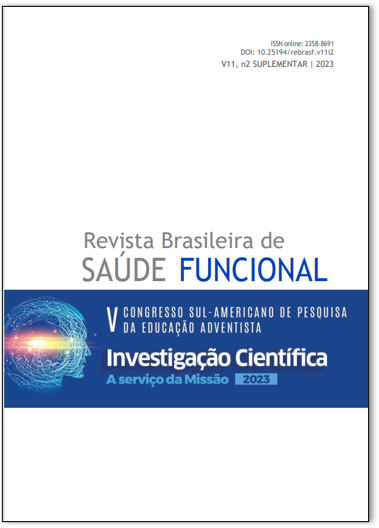Emotional Regulation Of University Students in a Bahia Boardship
DOI:
https://doi.org/10.25194/rebrasf.v11i2.1671Keywords:
Subjective well being, Emotion regulation, college studentsAbstract
Introduction: The growth of the population of university students has given rise to reflections on the demands that have started to emerge, whether they are related to the characteristics of the student, as well as the needs presented by university students, whether these are academic or psychosocial, therefore, regulation Emotional development proves to be useful for individuals, allowing them to adapt to everyday challenges and thus maintain a certain level of subjective well-being. Objective: To analyze the relationship between subjective well-being and emotional regulation in university students at a private boarding school in Bahia's reconcavo. Method: Two scales were used, one to assess emotion regulation strategies (suppression of emotions and cognitive reappraisal), the other to assess three dimensions of subjective well-being (positive affect, negative affect, satisfaction with life). A sociodemographic questionnaire was also included to characterize the sample. Participants were 41 university students, residents of a private boarding school in Bahia, selected in a non-random way. Justification: In view of the growth of this target audience, it has become essential to better understand the reality experienced by university students, as a way of identifying factors that can generate emotional dysregulation, as well as aspects related to the student's psychosocial development, obtaining subjective well-being. Results: The results indicated that emotion regulation strategies did not predict the increase in levels of subjective well-being. Final considerations: Therefore, it is considered pertinent to carry out and deepen the study on this theme.
References
Gross, JJ. (1998). Antecedent- and Response-Focused Emotion Regulation: Divergent Consequences for Experience, Expression, and Physiology. Journal of Personality and Social Psychology, 74 (1), 224-237. doi: 10.1037//0022-3514.74.1.224.
Gross, JJ. (2008). Emotion Regulation. In M. Lewis, J. M. Haviland-Jones & L. F. Barrett (Eds). Handbook of Emotions (3ª ed., pp. 497-512). New York: The Guildford Press.
CRISPIM IR. Estilos de vinculação, regulação emocional e partilha social das emoções em estudantes de universitários. Tese de Mestre em Psicologia Clínica e da Saúde. Universidade Lusófona de Humanidades e Tecnologias – Lisboa, 2015. DOI: https://doi.org/10437/6906
Folkman, S., & Lazarus, RS. (1988). Coping as a mediator of emotion. Journal of Personality and Social Psychology, 54(3), 466–475.
LEAHY RL, TIRCH D. Regulação Emocional em Psicoterapia: um guia para o terapeuta cognitivo-comportamental. Artmed: Porto Alegre, 2013. Tradução: Ivo Haun de Oliveira. ISBN-13: 978-8565852869.
VELOSO M, GOUVEIA JP, DINIS A. Estudos de validação com a versão portuguesa da Escala de Dificuldades na Regulação Emocional (EDRE). Psychologica. Faculdade de Psicologia e de Ciências da Educação da Universidade de Coimbra, 2011; no. 54: 100 p. DOI: https://doi.org/10.14195/1647-8606_54_4
SANTANA VS, GONDIM SM. Regulação emocional, bem-estar psicológico e bem-estar subjetivo. Estudos de Psicologia, Campinas – SP, 2016; vol. 21, no.1: 68 p. DOI: https://doi.org/10.5935/1678-4669.20160007
MOUTINHO HA, MONTEIRO A, COSTA A, FARIA L. Papel da Inteligência Emocional, Felicidade e Flow no Desempenho Acadêmico e Bem-Estar Subjetivo em Contexto Universitário. Rev. Iberoamericana de Diagnóstico y Evaluación – e Avaliação Psicológica. RIDEP, 2010; vol. 3, no. 52: 114 p. DOI: https://doi.org/10.21865/RIDEP52.3.08
Ribeiro, J. L., & Galinha, I. (2005). História e evolução do conceito de bem-estar subjectivo. Psicologia, Saúde & Doenças, 6 (2), 203-214
SILVA ÉC, HELENO MGV. Qualidade de vida e bem-estar subjetivo de estudantes universitários. Revista Psicologia e Saúde, Campo Grande – MS, 2012; vol.4, no.1: 76 p. DOI: https://doi.org/10.20435/pssa.v4i1.126
ALBUQUERQUE, AS., & TRÓCCOLI, BT. Desenvolvimento de uma escala de bem-estar subjetivo. Psicologia: teoria e pesquisa, Brasília, 2004; 20 (2): 164 p. DOI: https://doi.org/10.1590/S0102-37722004000200008
QUOIDBACH J., BERRY EV, HANSENNE M, MIKOLAJCZAK M. Positive emotion regulation and well-being: comparing the impact of eight savoring and dampening strategies. Personality and Individual Differences, 2010; vol. 49, no. 5: 373 p. DOI: https://doi.org/10.1016/j.paid.2010.03.048.
Gross, JJ. & John, OP. (2003). Individual Differences in Two Emotion Regulation Processes: Implications for Affect, Relationships, and Well-Being. Journal of Personality and Social Psychology, 85 (2), 348–362. doi: 10.1037/0022-3514.85.2.348.





